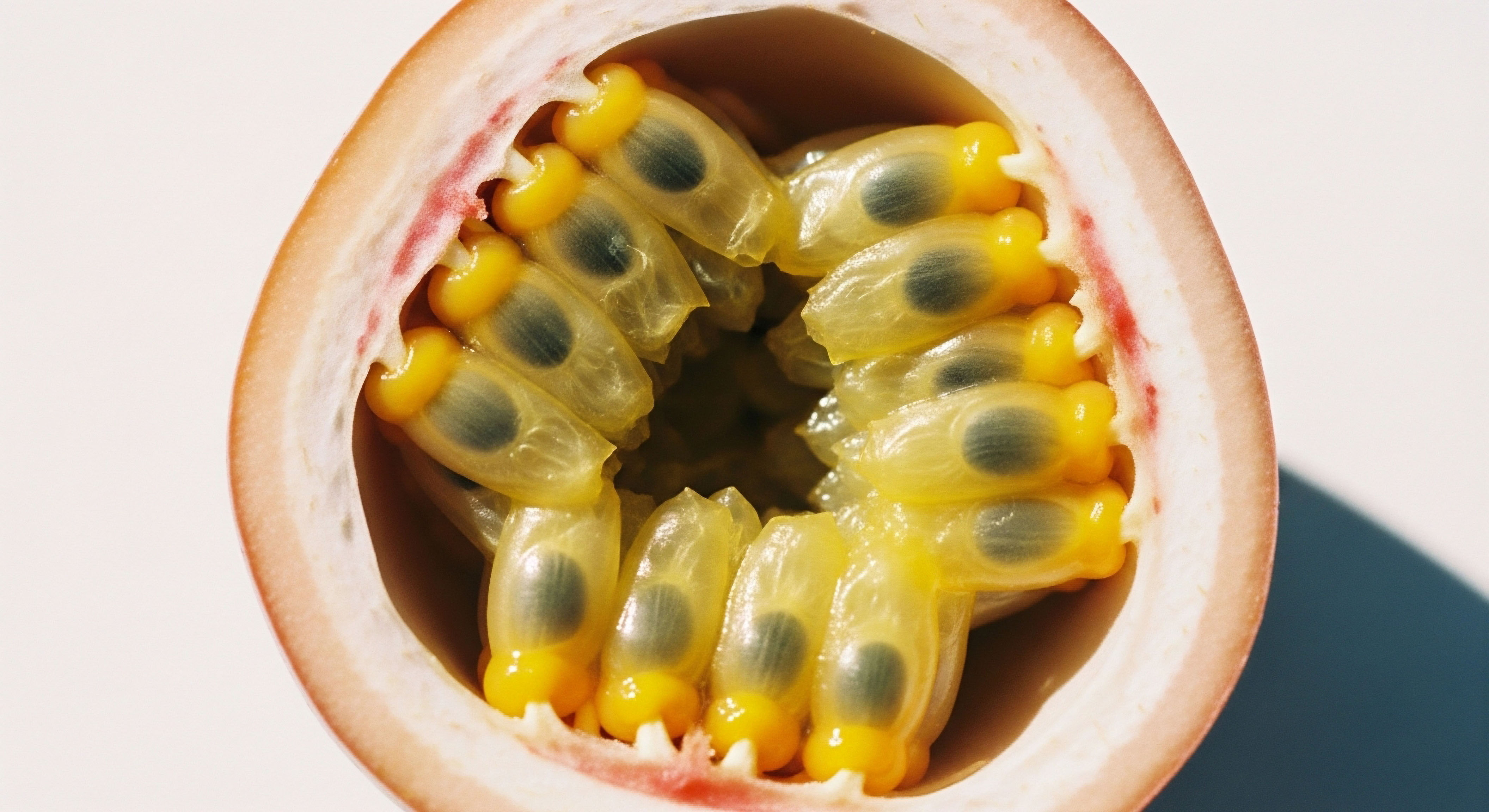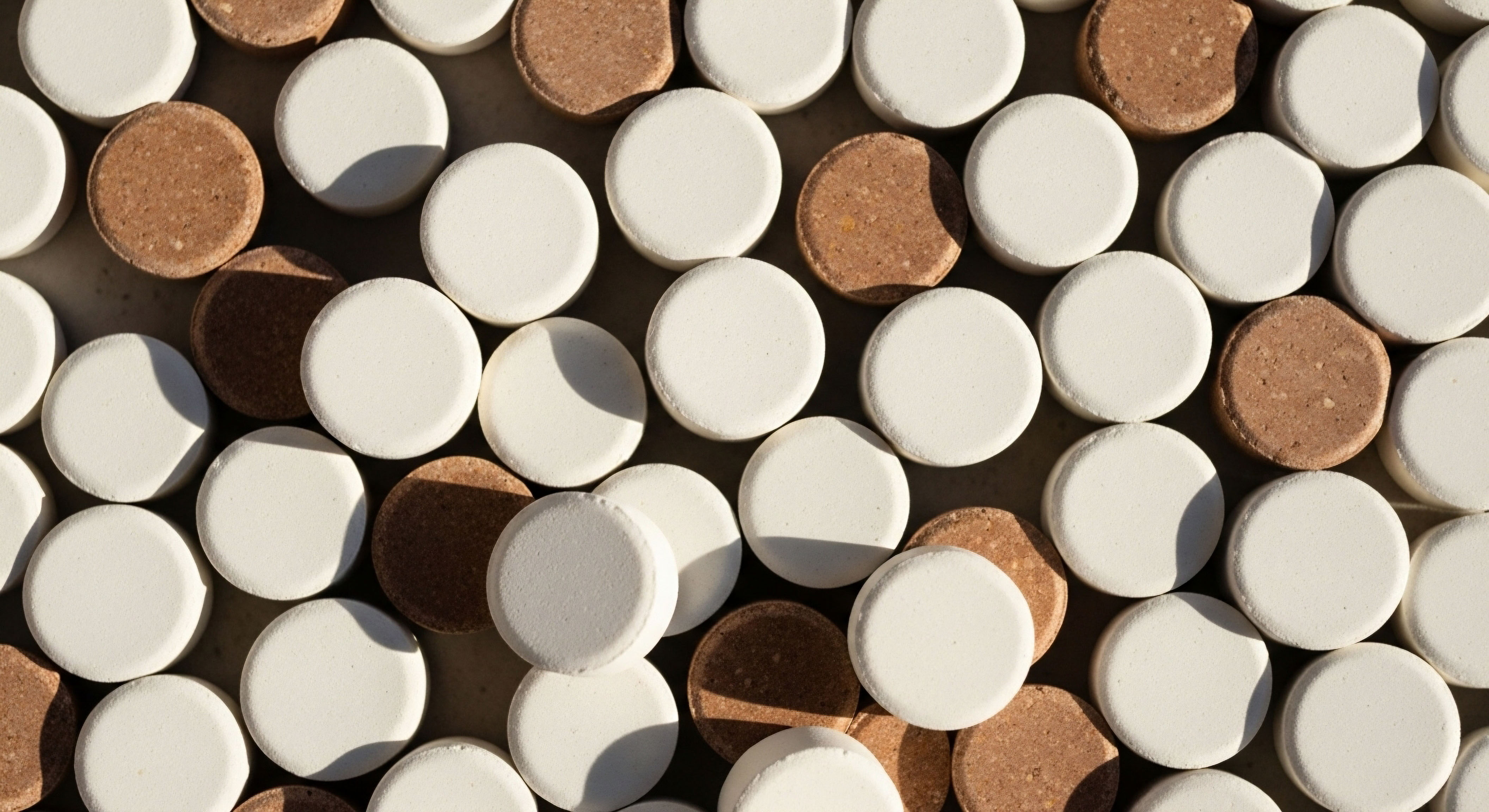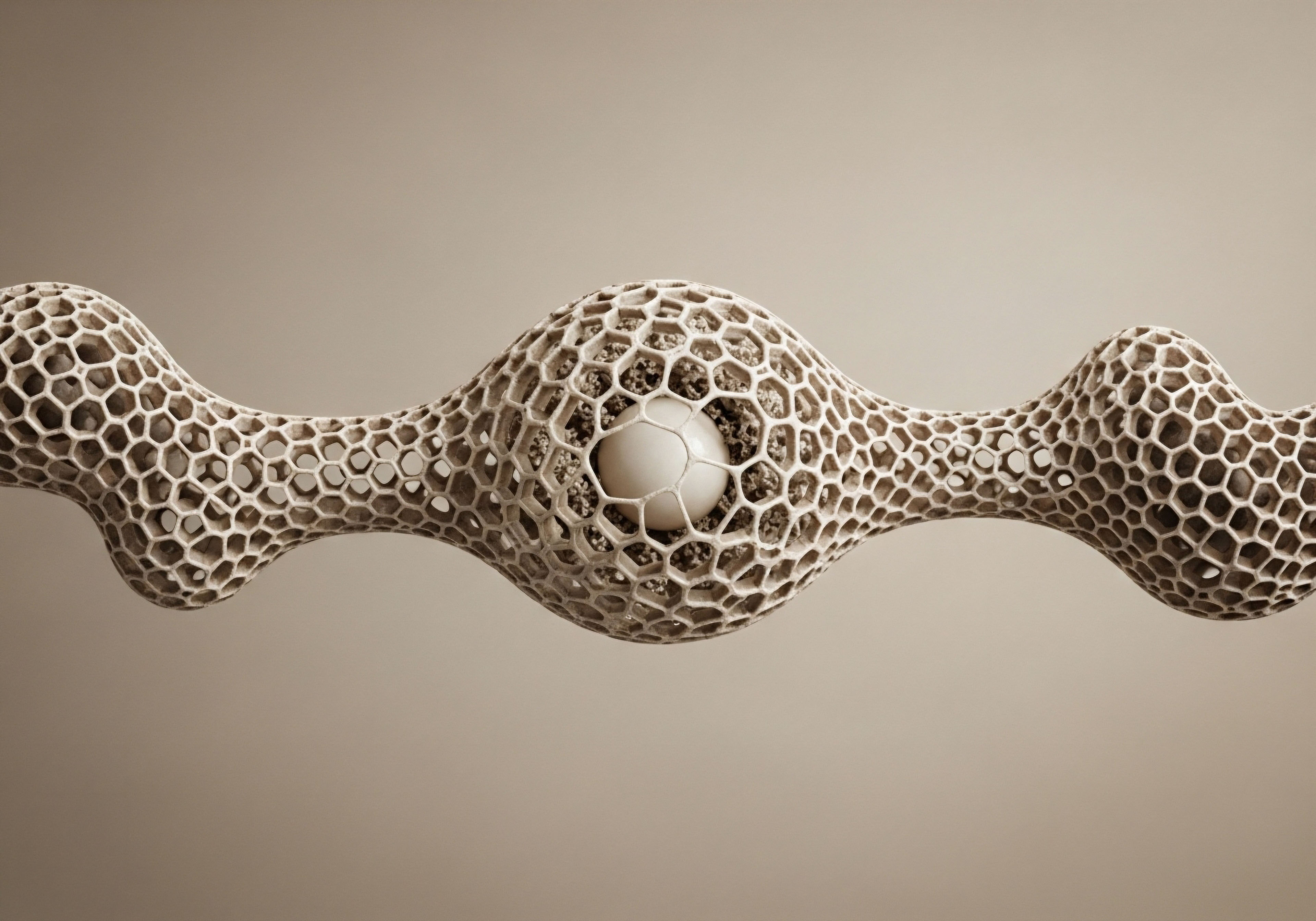

Fundamentals
You feel it in your energy, your mood, your sleep, and your body. That sense of profound biological dysregulation, where your own internal chemistry seems to be working against you. This experience, so common in adults navigating the complexities of hormonal shifts, is often discussed in terms of deficits or excesses of specific molecules like estrogen, testosterone, or cortisol.
Your lived reality of fatigue, mental fog, or unexplained weight changes is a valid and important signal from your body. The source of these signals, and a powerful site for intervention, resides in a place you might not immediately suspect ∞ your gut. The community of trillions of microorganisms living within your digestive tract, collectively known as the gut microbiome, functions as a dynamic and influential endocrine organ, directly participating in the regulation of your steroid hormones.
Understanding this connection is the first step toward reclaiming your biological sovereignty. Steroid hormones are chemical messengers derived from cholesterol, synthesized primarily in the adrenal glands and gonads. They are the architects of your physiology, governing everything from reproductive health and stress responses to metabolism and cognitive function.
These hormones circulate throughout your body, delivering instructions to cells. A crucial part of this process involves their metabolism and elimination, a task where the gut microbiome plays an indispensable role. Certain populations of gut bacteria produce specific enzymes that can reactivate hormones that were already packaged for removal, effectively reintroducing them into your system. This single mechanism demonstrates that the composition of your gut flora is a determining factor in the hormonal balance you experience day to day.
The vast community of microbes in your gut acts as a central command center for hormonal regulation, directly influencing your body’s steroid hormone levels.

The Gut as a Hormonal Reservoir
Think of your circulatory system as a river carrying hormonal messages. The liver is the primary filtration plant, deactivating these hormones and preparing them for excretion through the gut. Here is where the process becomes particularly interesting. A specialized collection of gut microbes, which scientists have termed the “estrobolome,” possesses the unique ability to reverse this deactivation process for estrogens.
These bacteria produce an enzyme called beta-glucuronidase, which essentially snips the “deactivated” tag off estrogen molecules, allowing them to be reabsorbed back into the bloodstream. A healthy, diverse microbiome maintains a balanced level of this enzyme, ensuring a normal rhythm of estrogen circulation. An imbalanced or dysbiotic gut, conversely, can lead to either an excess or a deficiency of circulating estrogen, contributing to symptoms associated with conditions like premenstrual syndrome (PMS), polycystic ovary syndrome (PCOS), and menopausal discomfort.
This principle extends beyond estrogen. The gut microbiome influences the body’s primary stress hormone, cortisol. The communication highway between your gut and your brain, known as the gut-brain axis, is a constant feedback loop. A gut populated by beneficial microbes helps to regulate the production of neurotransmitters like serotonin and GABA, which promote a sense of calm and well-being.
This, in turn, helps to modulate the hypothalamic-pituitary-adrenal (HPA) axis, the system that controls your stress response and cortisol release. Chronic stress can degrade gut health, and poor gut health can amplify the stress response. Targeted support for the microbiome presents a direct opportunity to interrupt this cycle and lower persistently high cortisol levels that drive inflammation, anxiety, and metabolic disruption.

What Are Probiotics and Prebiotics?
To influence this intricate system, we have two primary tools ∞ probiotics and prebiotics. They work together to reshape the microbial landscape of your gut.
- Probiotics are live, beneficial microorganisms, typically bacteria and some yeasts, that, when administered in adequate amounts, confer a health benefit. They are the reinforcements, directly adding to the population of helpful microbes in your gut. You can find them in fermented foods like yogurt, kefir, and kimchi, as well as in targeted dietary supplements.
- Prebiotics are the fuel for these beneficial microbes. They are specialized plant fibers that your body cannot digest, so they travel to the colon intact. There, they become a food source for your resident beneficial bacteria, helping them to grow, multiply, and carry out their vital functions. Prebiotics are found in foods like onions, garlic, bananas, and asparagus, and are also available as supplements.
By introducing specific probiotic strains and nourishing them with prebiotics, you are actively curating the microbial community that manages your hormonal health. This is a foundational protocol for anyone seeking to address the root causes of hormonal symptoms and build a more resilient internal ecosystem. It is a direct, evidence-based strategy for working with your body’s own biology to restore balance and function.


Intermediate
The recognition that the gut microbiome directly modulates steroid hormone levels opens a new frontier in personalized wellness protocols. Moving beyond foundational concepts, an intermediate understanding requires examining the precise biological mechanisms through which this influence is exerted. The relationship is a sophisticated biochemical dialogue, where microbial metabolites and enzymes function as a distinct layer of endocrine control.
For adults experiencing the physiological shifts of andropause, perimenopause, or chronic stress, targeting the gut microbiome with specific probiotic and prebiotic interventions becomes a clinically relevant strategy to recalibrate hormonal circuits.
The impact of these interventions is not generalized; it is highly specific to the hormones involved, the composition of an individual’s microbiome, and the strains of probiotics used. Research has begun to map these connections, providing a clearer picture of how supplementation can be tailored to achieve desired physiological outcomes, such as modulating estrogen activity, influencing androgen balance, or attenuating the stress response. This level of detail allows for a transition from a general wellness concept to a targeted therapeutic application.

Mechanisms of Hormonal Modulation
The gut microbiome employs several key mechanisms to regulate the body’s steroid hormone environment. Understanding these pathways clarifies how probiotic and prebiotic supplementation can yield tangible results. These processes work in concert to form a robust regulatory network that links digestive health directly to endocrine function.
- Enzymatic Processing of Hormones ∞ As discussed, the most well-documented mechanism is the enzymatic activity of the estrobolome. Gut bacteria that produce the enzyme β-glucuronidase can deconjugate estrogens, meaning they reverse the liver’s detoxification process and allow these hormones to re-enter circulation. An unhealthy microbiome can have too much of this enzyme activity, leading to estrogen excess, or too little, contributing to estrogen deficiency. Probiotic interventions can help modulate the populations of these bacteria, thereby helping to normalize β-glucuronidase activity and stabilize estrogen levels.
- Regulation of Sex Hormone-Binding Globulin (SHBG) ∞ The liver produces SHBG, a protein that binds to sex hormones, particularly testosterone and estrogen, and transports them in the blood in an inactive state. Only “free” hormones are biologically active. The gut microbiome influences liver function and can impact SHBG production. A 2019 meta-analysis focusing on women with PCOS found that probiotic and synbiotic (a combination of pro- and prebiotics) supplementation significantly increased SHBG levels. An increase in SHBG reduces the amount of free androgens, which is a primary therapeutic goal in managing PCOS.
- Production of Short-Chain Fatty Acids (SCFAs) ∞ When prebiotic fibers are fermented by beneficial gut bacteria, they produce metabolites called short-chain fatty acids, primarily butyrate, propionate, and acetate. These molecules are powerful signaling agents. They provide energy to colon cells, strengthen the gut barrier to prevent inflammatory molecules from leaking into the bloodstream (leaky gut), and regulate systemic inflammation. Chronic inflammation is a known disruptor of hormonal balance. By increasing SCFA production, prebiotics help lower the inflammatory load on the body, creating a more favorable environment for healthy endocrine function.
- Modulation of the Gut-Brain-Adrenal Axis ∞ The microbiome communicates directly with the central nervous system. A healthy gut lining and a balanced microbial population help regulate the HPA axis, the body’s central stress response system. Supplementation with specific probiotic strains, such as those from the Lactobacillus and Bifidobacterium families, has been shown to help lower circulating cortisol levels, particularly in individuals experiencing chronic stress. This is achieved by improving gut barrier integrity and influencing the production of neurotransmitters that calm the nervous system.
Targeted probiotic and prebiotic therapies can directly influence hormonal balance by modifying key pathways involving enzyme activity, carrier proteins, and inflammatory signals.

How Do Probiotics Affect Specific Hormones?
The clinical evidence reveals that the effects of probiotics are not uniform across all steroid hormones. The outcomes can differ based on an individual’s sex, menopausal status, and underlying health conditions. This specificity is crucial for tailoring effective protocols.
A large observational study using NHANES data provided significant insights into these differential effects in women. The research highlighted that probiotic consumption, either from yogurt or supplements, was associated with distinct hormonal profiles depending on menopausal status.
| Population | Hormone | Observed Association | Potential Clinical Implication |
|---|---|---|---|
| Premenopausal Women | Estradiol (E2) | Positive Association (Higher Levels) | May support healthy estrogen balance and menstrual cycle regularity. |
| Postmenopausal Women | Total Testosterone | Inverse Association (Lower Levels) | Could be beneficial in conditions of relative androgen excess after menopause. |
| Women with PCOS | Free Androgen Index (FAI) | Significant Reduction | Helps to lower the biological activity of androgens, addressing a core feature of the syndrome. |
| Adults Under Stress | Cortisol | Reduction | Attenuates the physiological stress response, reducing inflammation and anxiety. |
For men, the research is also promising, although much of the mechanistic work has been conducted in animal models. Studies have shown that specific probiotic strains can protect against stress-induced declines in testosterone. They appear to achieve this by up-regulating the expression of key enzymes in the testes responsible for testosterone synthesis, such as StAR (Steroidogenic Acute Regulatory Protein).
While more human trials are needed, this suggests a potential role for probiotics in supporting male endocrine health, particularly in the context of managing stress.


Academic
An academic exploration of the gut microbiome’s influence on host steroid hormone levels requires a conceptual shift. The microbiome is best understood as a distributed, persistent, and metabolically active endocrine organ. Its collective genome, the microbiome, contains at least 100 times more genes than the human genome, encoding a vast arsenal of enzymes and metabolic pathways that directly integrate with the host’s own endocrine signaling networks.
This perspective frames probiotic and prebiotic supplementation as a form of microbial endocrinology, a targeted intervention designed to modulate the function of this accessory organ to achieve specific, predictable physiological outcomes in the host.
The interaction is bidirectional and complex, involving not just the metabolism of circulating hormones but also the de novo synthesis of hormone-like molecules and the modulation of host gene expression related to steroidogenesis and receptor sensitivity.
A deep analysis of this system reveals a sophisticated regulatory architecture that links dietary inputs to fundamental aspects of human physiology, including reproduction, metabolism, and stress resilience. The evidence from population studies, clinical trials, and mechanistic animal models converges to support this view, providing a robust scientific foundation for the use of microbiome-targeted therapies in clinical practice.

The Microbiome’s Regulation of Steroidogenic Pathways
The gut microbiota’s influence extends beyond the simple reactivation of conjugated hormones in the gut lumen. It actively participates in the systemic regulation of steroidogenesis, the metabolic pathway that produces steroid hormones from cholesterol. Animal models provide compelling evidence for this deep level of integration.
For instance, studies on male mice subjected to restraint stress demonstrated that supplementation with specific strains of Lactobacillus prevented the expected decline in serum testosterone. The mechanism was a direct upregulation of testicular gene expression for key steroidogenic enzymes, including Steroidogenic Acute Regulatory protein (StAR), P450 side-chain cleavage enzyme (P450scc), and 17β-hydroxysteroid dehydrogenase (17βHSD). This indicates that microbial signals originating in the gut can remotely control the genetic machinery of hormone production in the gonads.
Furthermore, the gut microbiome is a source of hormone-like substances and can produce steroid molecules itself. Certain bacterial species can synthesize androgens from precursor molecules. The colonic contents of healthy men have been shown to contain high levels of free dihydrotestosterone (DHT), a potent androgen, produced by the local microbiota.
This local production can have systemic effects. This capacity for de novo synthesis and modulation of host production pathways solidifies the microbiome’s status as an endocrine organ. Interventions with probiotics and prebiotics, therefore, are a means of optimizing the function of this organ.
The gut microbiome functions as a bona fide endocrine organ, capable of both synthesizing steroid hormones and remotely regulating the genetic machinery of hormone production in the host’s gonads and adrenal glands.

What Are the Regulatory Hurdles for Marketing Probiotics for Hormonal Health?
Despite the accumulating scientific evidence, significant regulatory challenges exist in translating these findings into clinical products with specific health claims. In most jurisdictions, including the United States and Europe, probiotics are regulated as foods or dietary supplements, not as drugs. This classification severely restricts the types of claims that can be made.
A product cannot be marketed with the explicit claim that it treats, cures, or prevents a disease, such as PCOS or hypogonadism. Instead, manufacturers are limited to “structure/function” claims, which describe the role of a nutrient or dietary ingredient intended to affect the normal structure or function in humans (e.g. “supports healthy hormonal balance”).
To make a disease-specific claim, a product must undergo the rigorous and costly process of drug approval, which involves multiple phases of clinical trials to prove both safety and efficacy to the standard of a pharmaceutical agent. The inherent biological variability of live organisms, host-microbiome interactions, and the complexity of conditions like hormonal imbalances make this a difficult path.
Consequently, the commercial landscape consists of products marketed for general gut health, leaving clinicians and informed consumers to extrapolate their use for specific endocrine purposes based on the available scientific literature. This creates a gap between scientific possibility and commercial reality, underscoring the need for continued research to solidify the evidence base for specific strain-function relationships.

Clinical Data Analysis a Closer Look
A granular analysis of key studies reveals the specificity and potential of targeted supplementation. The 2023 study leveraging NHANES data is particularly powerful due to its large, nationally representative sample of 2,699 women. The survey-weighted generalized linear models and propensity score matching used in the analysis add statistical rigor.
The finding that probiotic intake was associated with higher estradiol (E2) in premenopausal women (p-value < 0.05) and lower total testosterone in postmenopausal women (p-value < 0.05) is a statistically significant observation at a population level. This suggests that the influence of probiotics on sex hormone metabolism is context-dependent, varying with the host's own endocrine status (i.e. pre- vs. post-menopause).
Similarly, the 2019 meta-analysis on PCOS, which pooled data from 13 clinical trials involving 855 participants, provides high-quality evidence for a specific clinical application. The analysis showed that probiotic/synbiotic intervention led to a statistically significant increase in SHBG (Standardized Mean Difference ∞ 0.56) and a significant reduction in the Free Androgen Index (SMD ∞ -0.58).
The FAI is a calculated value (Total Testosterone / SHBG) that reflects the amount of bioavailable androgen. Lowering the FAI is a primary goal in PCOS management. The ability of microbiome modulation to achieve this demonstrates a clinically meaningful effect on androgen biovailability.
| Intervention Type | Target Population | Key Findings | Supporting Evidence |
|---|---|---|---|
| Probiotic Supplementation (General) | Premenopausal Women | Associated with higher serum estradiol levels. | Observational data from NHANES 2013-2016. |
| Probiotic Supplementation (General) | Postmenopausal Women | Associated with lower total testosterone levels. | Observational data from NHANES 2013-2016. |
| Probiotics & Synbiotics | Women with PCOS | Significantly increased SHBG and decreased Free Androgen Index (FAI). No significant change in total testosterone. | Meta-analysis of 13 randomized controlled trials. |
| Prebiotics (e.g. Fructans) | Adults (General) | May lower salivary cortisol levels in response to stress. Suppresses β-glucuronidase activity. | Review articles summarizing human trials. |
| Probiotics (L. rhamnosus, L. fermentum) | Male Mice (Stress Model) | Prevented stress-induced testosterone decline by upregulating testicular steroidogenic enzymes (StAR, P450scc). | Mechanistic animal study. |

References
- Shori, Amal Bakr, and Ahmad Salihin Baba. “Impact of Probiotics and Prebiotics on Gut Microbiome and Hormonal Regulation.” Foods, vol. 12, no. 23, 2023, p. 4344.
- Li, et al. “Association of probiotic ingestion with serum sex steroid hormones among pre- and postmenopausal women from the NHANES, 2013 ∞ 2016.” Frontiers in Nutrition, vol. 10, 2023.
- Jafari, et al. “The effect of probiotics, prebiotics, and synbiotics on hormonal and inflammatory indices in women with polycystic ovary syndrome ∞ a systematic review and meta-analysis.” Nutrition Journal, vol. 18, no. 1, 2019, pp. 1-13.
- Jang, et al. “Probiotic and Prebiotic Supplementation Ameliorates Chronic Restraint Stress-Induced Male Reproductive Dysfunction.” Journal of Medicinal Food, vol. 24, no. 5, 2021, pp. 525-533.
- Kubala, Jillian. “11 Natural Ways to Lower Your Cortisol Levels.” Healthline, 2 Jan. 2024.

Reflection

Recalibrating Your Internal Ecosystem
The information presented here provides a map, a detailed schematic of the profound and intricate connections between your gut and your endocrine system. You now have a deeper appreciation for the biological mechanisms that link the food you eat, the stress you experience, and the hormonal signals that define so much of your daily reality.
This knowledge is the starting point. It equips you to view your body not as a collection of separate parts, but as a single, integrated system where a change in one area creates ripples throughout the whole. The feeling of being “off” is a valid signal that this system requires attention and support.
Your personal health path is unique. Your microbiome is as individual as your fingerprint, shaped by a lifetime of experiences, dietary choices, and environmental exposures. The journey toward hormonal optimization and renewed vitality begins with understanding these foundational principles. It proceeds with a commitment to nourishing the internal ecosystem that supports you.
Consider this knowledge a tool, empowering you to ask more informed questions and to seek strategies that honor the complexity and intelligence of your own biology. The potential to feel and function better is encoded within your own systems, waiting to be activated.



